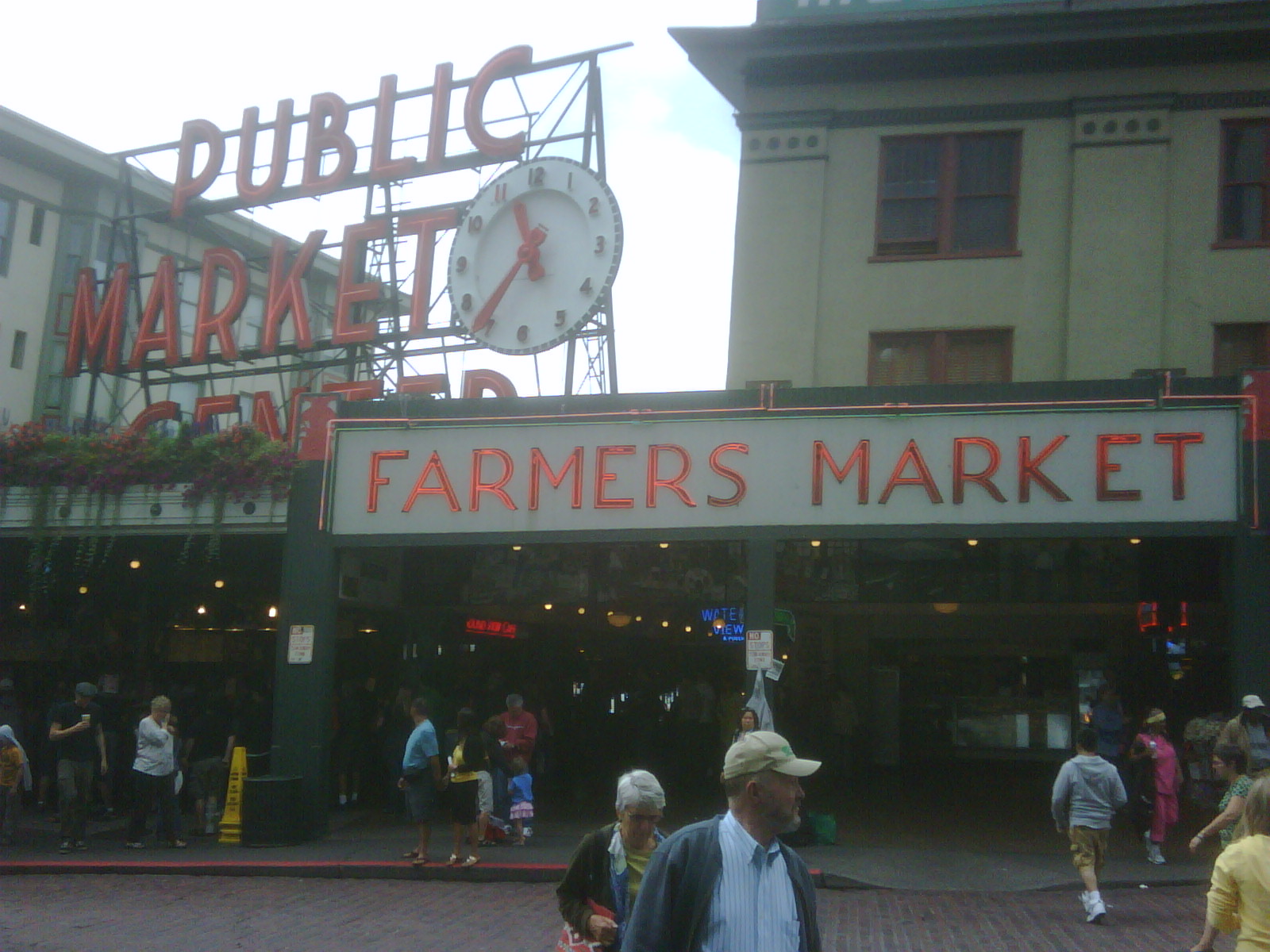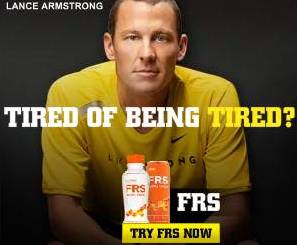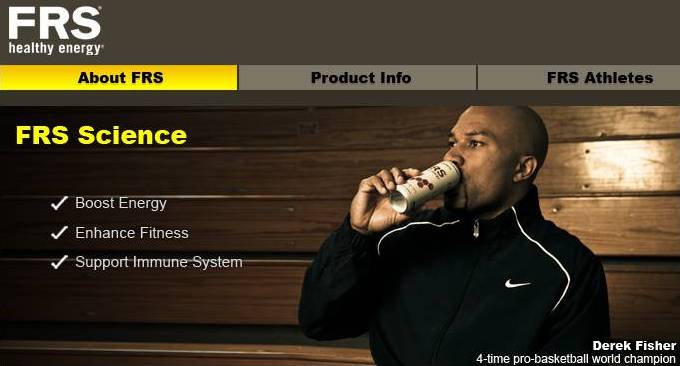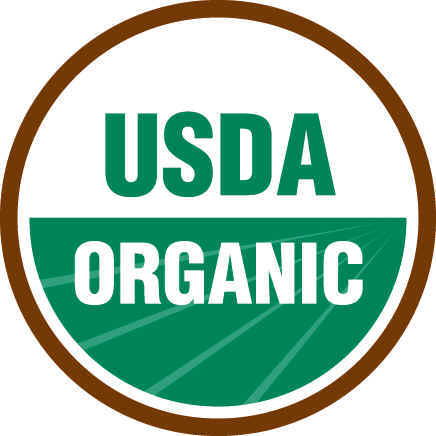Entries by Michael Atkins (1064)
STL to Host Blawg Review on Monday -- So Please Send Me Your Links Soon!

I’m happy to report STL is hosting Blawg Review #225 on Aug. 17 — the 102nd anniversary of Seattle’s beloved Pike Place Market. I’m counting on my fellow blawggers to send me content to include in my inaugural review. So, please favor me with links to your favorite recent posts about trademarks, IP law, Seattle, or public markets. Still sorting out how that’s all going to tie together, but I know I can’t do it without you. (Apropos of nothing, I’ll point out that my friend David Donoghue of the Chicago IP Litigation Blog has hosted the Blawg Review and its sidekick, the Carnival of Trust, a whopping four times (see here, here, and here, and here. Wow!)
Is Nike Connected with FRS Energy Drinks? Its Logos Are
I assume Nike is on board with its shirts and jackets being featured in ads for FRS energy drinks. Not all FRS endorsers appear to wear Nike, but the two most prominent do — enough to suggest a connection exists. Or am reading too much into this?


NWA Claims Spokane Company's Use of "Northwest" Infringes Its Rights

Northwest Airlines, Inc. (now a subsidiary of Delta Airlines, Inc.), has challenged a Spokane, Wash.-based online travel guide’s use of GO NORTHWEST! as a trademark.
The travel guide publisher, Go Northwest, LLC, obtained a federal registration for its mark last year, claiming it has used the mark in commerce since 1999.
Northwest Airlines claims Go Northwest’s use infringes its trademark rights by creating a likelihood of confusion with its NORTHWEST and NORTHWEST AIRLINES registered marks, which Northwest Airlines claims it has used since 1926.
The Seattle Post-Intelligencer’s Aerospace News blog first reported on the dispute on Aug. 6 and ran a follow-up post on Aug. 7. (Kudos to the short-staffed, scrappy, now exclusively online paper for running the story. Two weeks ago, it did trademark law followers a similar favor by reporting on the Smith-Starbucks trade dress dispute.)
Northwest Airlines apparently acted in response to Go Northwest’s application to register its mark in the United Kingdom and Australia, saying it also recently discovered Go Northwest’s U.S. registration. The airline initially demanded that Go Northwest abandon its application to register its mark in those countries, voluntarily cancel its United States registration, and stop any and all use of its mark, but later scaled back its demands somewhat.
Go Northwest so far has rejected the airline’s demands, pointing to the ten-years the parties arguably have coexisted without consumer confusion. For those wanting to read the blow-by-blow, The P-I’s posts link to the letters the parties’ lawyers have exchanged.
Considering all this, it seems to me: (1) Northwest Airlines doesn’t have a monopoly on the descriptive use of “Northwest,” particularly by a company located in the Northwest; (2) it seems that if confusion were indeed likely, Go Northwest would have been on NWA’s radar screen a long time ago; (3) if it turns out that NWA has known about Go Northwest’s use of its mark for the last ten years, it’s going to have a hard time overcoming the doctrine of laches; and (4) it seems silly that NWA is causing a ruckus about its NORTHWEST trademarks now when it appears to be phasing out use of those marks following its merger with Delta. Indeed, I was hard-pressed to find prominent use of the marks on NWA’s own Web site.
As a final observation, now that lawyer letters routinely make it into the media, lawyers consciously need to write for at least two audiences — the recipient, and the public. Neither lawyer was jerky in this case, but you can imagine the damage that a lawyer’s rudeness easily could cause his or her client. That’s not a bad thing. I’m all for giving lawyers extra incentive to act professionally — if not like decent human beings.
Full disclosure: I am still bitter about NWA’s abruptly cancelling my flight home to Seattle on my way back from last year’s INTA meeting in Berlin, stranding me in Amsterdam and putting me up in a borderline-dangerous truck stop motel 30 miles from the airport, and then cancelling my second flight home the next day. For purposes of completeness, NWA also lost my luggage — again in Amsterdam — during another return flight. Dispute these disturbing incidents, I’ve done my best to remain neutral in writing this post. Seriously.
Law.com Highlights Keyword Lawsuits Against Google
Law.com yesterday highlighted the keyword lawsuits against Google — and Google’s recent success in defending them.
Blogger Eric Goldman thinks the suits may be ill-fated. “We’re starting to see some of these lawsuits crack,” he said. “My current hypothesis is that they never made sense in the first place — the plaintiffs got all excited to go take down Google, but suing Google is a loser’s bet because Google’s going to fight to the death.”
I agree that Google’s going to fight to the death, though I’m not sure anyone’s excited at the prospect of starting that fight. Proving trademark infringement can be hard enough. When doing so challenges the very model on which Google depends? That’s a suit a rational plaintiff would take on only if it thought it had no other choice.
So do Google plaintiffs have no other choice? I don’t think so. Seems to me they could get all the relief they need by suing the competitor that’s buying their trademarks.
USDA's Organic Labeling Requirements Function as a Solid Certification Mark
 The SF Gate had a good article this weekend about the U.S. Department of Agriculture’s National Organic Program. The USDA ORGANIC seal functions as a certification mark, as only producers meeting the NOP’s specifications can use it in connection with their goods. But it’s food labeling law rather than trademark law that governs its use. Indeed, I couldn’t find the seal as a registered trademark anywhere.
The SF Gate had a good article this weekend about the U.S. Department of Agriculture’s National Organic Program. The USDA ORGANIC seal functions as a certification mark, as only producers meeting the NOP’s specifications can use it in connection with their goods. But it’s food labeling law rather than trademark law that governs its use. Indeed, I couldn’t find the seal as a registered trademark anywhere.
According to the NOP, its labeling requirements apply to “raw, fresh products and processed products that contain organic agricultural ingredients.” In summary:
- Products labeled as “100 percent organic” must contain only organically produced ingredients and processing aids.
- Products labeled “Organic” must consist of at least 95 percent organically produced ingredients. Any remaining product ingredients must consist of approved nonagricultural substances approved.
- Processed products that contain at least 70 percent organic ingredients can use the phrase “made with organic ingredients.”
- Organic production and handling operations must meet certification standards to become accredited by USDA-accredited certifying agents. Applicants must submit information about their organic system plan, including their practices and substances used in production, record keeping procedures, and practices to prevent commingling of organic and non-organic products.
Persons who knowingly sell or label as organic a product that is not produced and handled in accordance with the NOP’s regulations are subject to a civil penalty of up to $11,000.
The SF Gate article says complying with NOP standards can be difficult, but those who do think it pays off. “It’s worth it to us,” said one organic producer, even though becoming USDA certified organic increases her costs by at least 50 percent. “We’re mission driven and committed to our No. 1 value: authentic organic.”
Though other certifying organizations exist, a Seattle-based consumer researcher said the USDA’s seal is the only one that counts. “The USDA symbol is the only one that mainstream consumers can recognize. It’s the most recognizable and credible symbol that would inspire consumers to try a new product in the organic non-food space. The other ones, they’re just noise.”
These folks don’t talk about labeling compliance in terms of trademark law. But they sure speak the language.